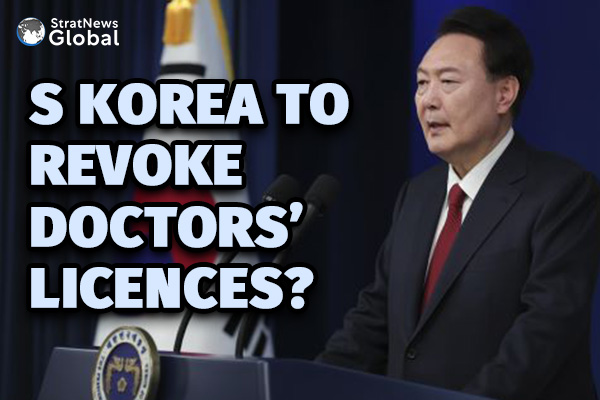South Korean President Yoon Suk-Yeol speaks during his New Year’s speech at the presidential office in Seoul, South Korea, Jan 1, 2024. (Photo Courtesy: South Korea Presidential Office )
The South Korean government is threatening to prosecute thousands of junior doctors who have gone on strike over the past week, and cancel their medical licences if they do not return to work by Thursday end of day.
The doctors are protesting against a government plan to dramatically increase the number of medical seats from 3000 to 5000 this year, to increase the number of doctors in the country with one of the lowest doctor-to-patient ratios among developed countries. The government says it hopes to add 10,000 new doctors by 2035 to deal with the country’s fast-ageing population.
The junior doctors are insisting that the government address their issues like pay and work conditions first. They also say that increasing the number of physicians. would dilute the quality of care because less competent practitioners would enter the system, although neither the public nor the government is buying that argument.
The strike has disrupted medical services across the country, with surgeries being postponed at major teaching hospitals. Critical care has remained mostly unaffected, bar a few isolated incidents.
Appealing to the doctors to return to work, Prime Minister Han Duck-soo on Wednesday said he would send military and community doctors to hospitals from next month as part of emergency measures to offset the disruption caused by the strike.
Vice Health Minister Park Min-soo said that as of Wednesday night, only 294 of the more than 9,000 trainee doctors on strike have returned to work. As for the others, “We’ve said that we won’t hold them responsible for leaving their worksites if they return by today,” he said.
“Doctors are there to serve patients, and those patients are anxiously waiting for you. This isn’t the way to protest against the government.”
South Korean law allows the government to order doctors back to work if it foresees grave risks to public health, and those who refuse can have their medical licences suspended for up to one year and face a three year jail term or a 30 million won (approximately $22,500) fine.
AFP quoted Kim Jae-heon, the secretary-general of an NGO advocating free medical care, as saying that “If the government were to back down now, they would perceive it as a major setback ahead of the upcoming general elections,” slated for April 10.
















